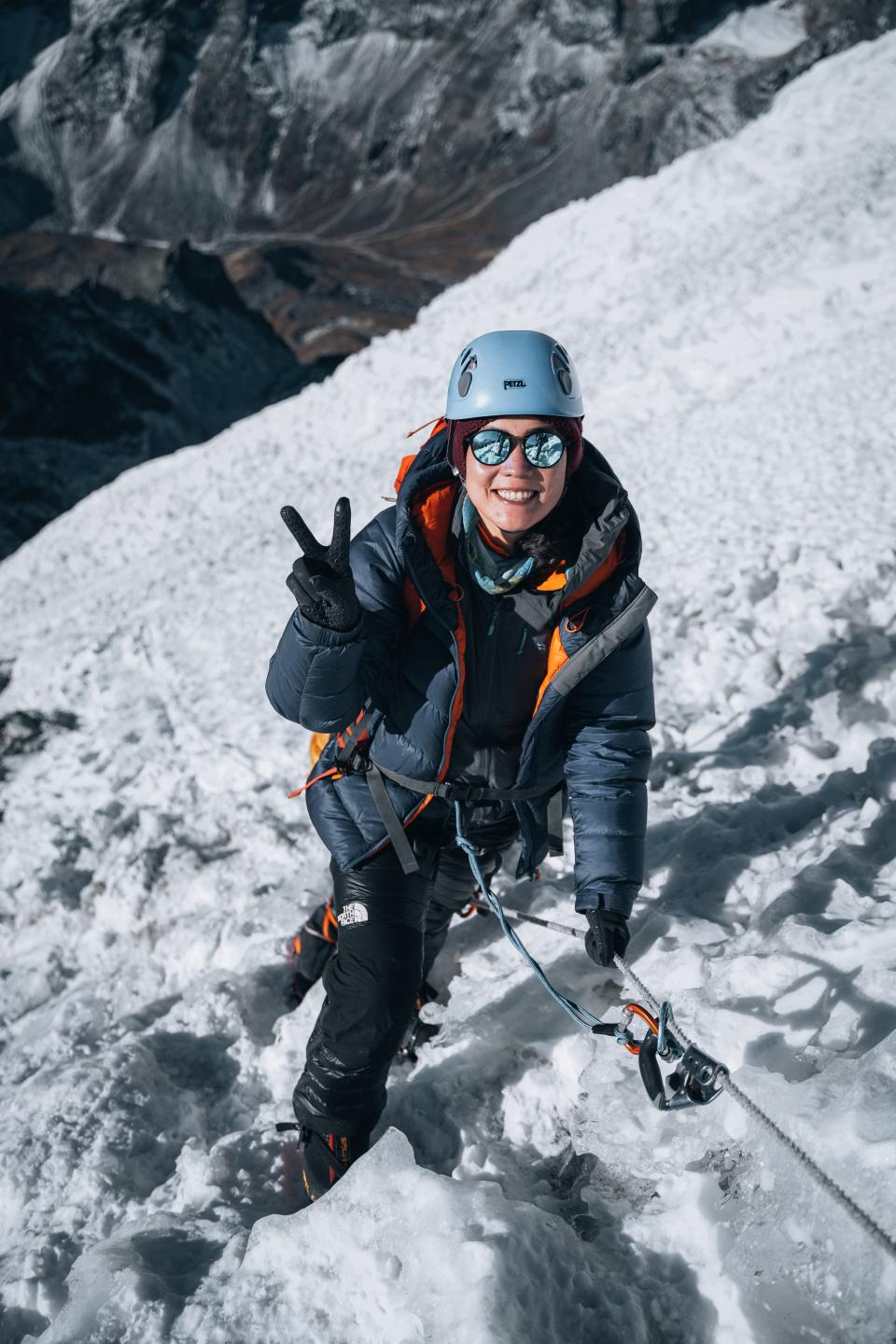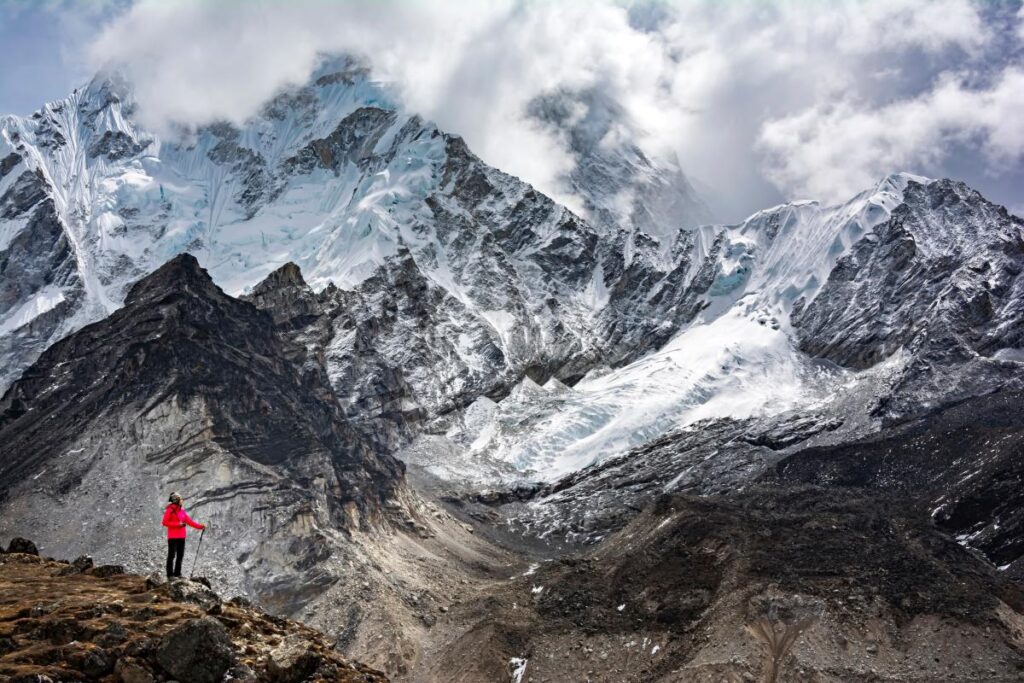Kriangkrai Thitimakorn/Getty
In spring 2025, Freshta Ibrahimi aims to make history—by becoming the first Afghan woman to summit the highest peak in the world. Yet while climbing Mount Everest is a bucket list achievement for any serious mountaineer, for 32-year-old Ibrahimi, who already has a decade of climbing experience under her belt (having recently conquered Nepal’s Lobuche East), Everest represents more than just a physical challenge. She wants to wave a flag of hope for women living under an oppressive Taliban regime—and forge a path for them to one day follow suit.
Born in Iran to Afghan parents, who had relocated to Tehran while the Taliban were first in power, Ibrahimi grew up captivated by tales of Afghanistan’s challenging countryside terrain. “I remember my parents telling me that they made their own shoes because it was very difficult for them to go down to the city,” Ibrahimi says, describing how they fashioned wooden blocks and rubber for added grip in the snow. “The stories made me so interested in the mountains.”
The mountaineering seed was planted young. Then, in November 2001, political shifts brought the family back to Afghanistan, as US troops and NATO allies took power. Driven by patriotism and a desire to support their country’s recovery, Ibrahimi’s parents resettled the family in Kabul. Many gender-based laws had loosened, including the ban of education for women and girls, yet enough oppressive societal beliefs lingered for Ibrahimi to notice a stark shift in her day to day.

Freshta Ibrahimi during a climb
Manishh Tamang
Moving from Iran to Afghanistan was a life-altering experience, she says: “I couldn’t go out as much as I wanted. I kept being told that it’s not safe outside.” Still, even amongst the adversity, it didn’t stop her budding love of sports and the outdoors as a young girl. “I discovered kite running in Afghanistan and I was the best,” she says, explaining how she even taught her brother. The dynamic was unusual—most young girls, says Ibrahimi, were expected to focus on domestic skills like cooking, and few would be permitted to play with boys.
As a teenager, she broke social norms again, aided by the shifting opinions within her family circle. “I think I was lucky at that time,” says Ibrahimi, who began to talk openly with her parents about pursuing educational ambitions. “When I reached the age my sister was when she got married, the support was there for the younger generation of women.” She attained a full scholarship to study at the American University of Afghanistan. Higher education became a catalyst for her life in the outdoors, connecting her with Afghanistan’s first female mountaineering group. Ibrahimi assisted with recruiting the teens from schools across the country while working as a project coordinator for Ascend, a US non-profit organization that works to empower girls and women in Afghanistan through sport, tackling peaks like Mount Noshaq, Afghanistan’s highest mountain. (Ascend facilitated the climb that led to the first Afghan woman to summit Noshaq in 2018.) While the group is now scattered across different countries, her role within that growing movement propelled her pursuit of outdoor adventure.
For Ibrahimi, the mountains provided solace from the threat of Taliban resurgence. Scaling 5000 to 6000 meters in remote ranges, she ventured even higher than the peaks in her parents’ stories—now aided by mountaineering equipment thanks to her access to urban Afghanistan and formal training. But even with groups like Ascend helping to provide access to climbing lessons and gear, Afghanistan still has little climbing culture: harsh conditions deter those who haven’t grown up in the mountains, not to mention the risk of landmines, and a history of guerilla-style violence in rural areas. Even today, Afghanistan’s mountainous terrain, which covers 75% of the country, is unclimbed. “Climbing in Afghanistan is untouched and raw,” says Ibrahimi. “When you go, you feel like you’re the first person there.”
Her small window of freedom to climb Afghanistan’s mountains was short-lived; resurgent political turmoil reached such severity in 2019 that Ibrahimi sought refuge in the UK. The Taliban had been gradually regrouping, predominantly around the Pakistan border, and strengthened following the withdrawal of NATO in 2014. When foreign US troops controversially withdrew in 2021, as part of a 2020 peace agreement negotiated directly with the Taliban, the Afghan government was left to fight independently—and the subsequent takeover was swift. In less than two weeks, the Taliban regained control, forcing citizens back under an increasingly oppressive gender apartheid. Amnesty International reports that mandatory male chaperone restrictions for all women have now worsened to forbidding all unnecessary trips outside of their homes. Most recently, women were banned from speaking in public. Sports are distant memories.
“I want the women of Afghanistan to believe their place is not underground but on top of the world”
“Suddenly a wall is in front of them that they can’t climb,” says Ibrahimi. “If they do, they’ll be killed. They are being forced by the Taliban to be silent.” By summiting Mount Everest next year, she hopes to climb that metaphorical wall for them—raising awareness and providing a symbol of strength and inspiration by breaking a record and pushing her message through her growing platform. “I want the women of Afghanistan to believe their place is not underground but on top of the world,” she says.
Compared to the Afghan mountains, Nepal is luxurious for Ibrahimi, with established base camps and well-trodden set-ups for climbers. However, this level of organization is costly: a climbing permit alone is priced at $11,000, along with additional expenses like a typically refunded, $4,000 trash permit. She’s raising huge funds herself through GoFundMe and social media, and the physical training is equally demanding. In preparation for the climb itself, she’s undergoing endurance, strength, and meticulous altitude training, including scaling 7,000 meters just days before she will ascend Everest: “I am training every day above Camp Four (nicknamed the Death Zone). I’m in an oxygen mask; I am training the lungs that I can’t see but I can feel.”
The mission to stand on top of the world isn’t enough for Freshta Ibrahimi, though. The climber is already planning her next step, launching The Unstoppable Project. Inspired by her own therapeutic relationship with nature, Ibrahimi will be aiding other women who have faced obstacles in accessing outdoor activities. Through a series of programs, including group hikes, climbing, and kayaking, she’s creating a community that has the capacity to both heal and empower, helping women to harness an unstoppable version of themselves. Ibrahimi is already running small hiking excursions to her local Peak District, a national park in the UK, for female refugees in Manchester. “Standing at the summit of Mount Everest will mean standing at the base of a different mountain,” she says.
Originally Appeared on Condé Nast Traveler
The Latest Stories from Condé Nast Traveler
Read the full article here


